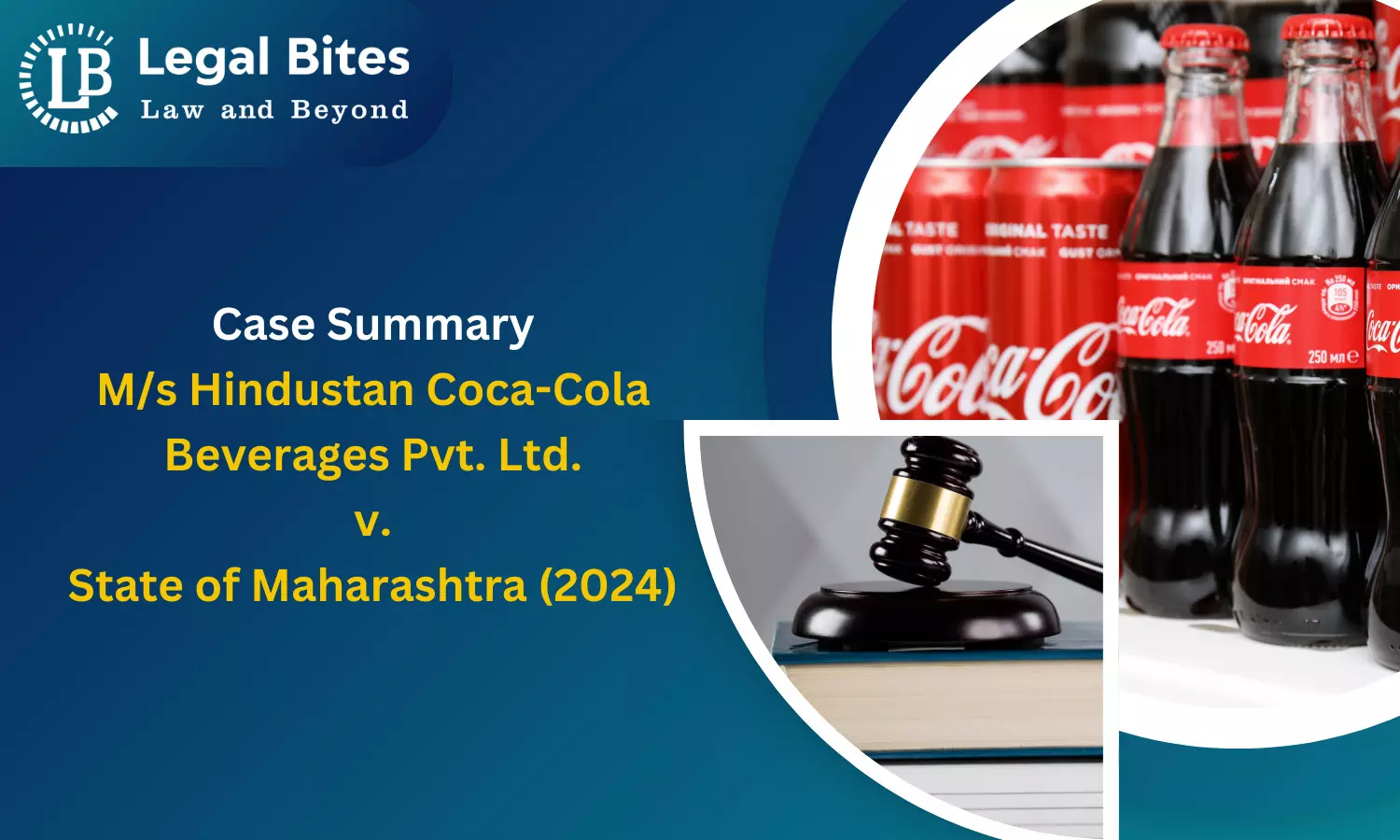Case Summary: M/s Hindustan Coca-Cola Beverages Pvt. Ltd. v. State of Maharashtra (2024) | Food Adulteration Case
This case underscores the critical importance of procedural compliance and the timely exercise of statutory rights in food adulteration cases.

The case of M/s Hindustan Coca-Cola Beverages Pvt. Ltd. v. State of Maharashtra reiterates the judiciary's role in addressing allegations of food adulteration while safeguarding the procedural rights of the accused.Title of the Case: Hindustan Coca-Cola Beverages Pvt. Ltd. v. State of MaharashtraCitation: Criminal Application No. 2315 of 2010 with Criminal Application No. 4688 of 2024Court: High Court of Judicature at Bombay, Aurangabad BenchBench: Justice Y. G. KhobragadeJudgment...
The case of M/s Hindustan Coca-Cola Beverages Pvt. Ltd. v. State of Maharashtra reiterates the judiciary's role in addressing allegations of food adulteration while safeguarding the procedural rights of the accused.
Title of the Case: Hindustan Coca-Cola Beverages Pvt. Ltd. v. State of Maharashtra
Citation: Criminal Application No. 2315 of 2010 with Criminal Application No. 4688 of 2024
Court: High Court of Judicature at Bombay, Aurangabad Bench
Bench: Justice Y. G. Khobragade
Judgment Pronounced On: December 11, 2024
Relevant Sections: Sections 7(i), 2(ia)(a), 2(ia)(h), 16, and 17 of the Prevention of Food Adulteration Act, 1954; Section 482 of Code of Criminal Procedure, 1973.
Facts of the Case
Nature of Application: The applicant, Hindustan Coca-Cola Beverages Pvt. Ltd., filed an application under Section 482 of the CrPC seeking to quash the order dated March 24, 2010, issued by the Chief Judicial Magistrate (CJM), Jalna, initiating process under Section 204 CrPC for alleged contravention of the Prevention of Food Adulteration Act, 1954 (PFA Act).
Background: The Food Inspector (respondent) inspected the premises of M/s Brooton Marketing on July 26, 2001. The inspector observed suspended fibrous matter in sealed glass bottles of "Sweetened Carbonated Beverages, Canada Dry" manufactured on June 13, 2001. Samples were collected for testing and subsequently analyzed by the Regional Public Health Laboratory, Aurangabad.
Report Findings: The report dated August 28, 2001, concluded that the sample contained extraneous fibrous and particulate suspended matter, rendering the product non-compliant with the standards prescribed under the PFA Act.
Sanction and Prosecution: Based on these findings, the Joint Commissioner, FDA, Aurangabad, granted sanction for prosecution on March 15, 2003. A complaint was filed on May 13, 2003, against the accused (including Hindustan Coca-Cola as accused no. 4).
Issues
- Was the prosecution delayed beyond permissible limits, thereby violating the applicant’s statutory rights under the PFA Act?
- Did the applicant’s failure to seek reanalysis under Section 13(2) of the PFA Act bar them from challenging the proceedings?
- Should the complaint and subsequent proceedings be quashed under Section 482 of CrPC?
Applicant's Contentions
Delay in Filing Complaint: The applicant argued that the complaint was filed 16 months after the "Best Before" date of the product, which expired on December 12, 2001. This delay deprived the accused of their statutory right under Section 13(2) of the PFA Act to request further analysis by the Central Food Laboratory.
Validity of Samples: The applicant contended that the prosecution was initiated after the destruction of the samples under judicial order, thereby violating the procedural safeguards required for fair adjudication.
Quashment of Proceedings: It was argued that the order of issuance of the process and the subsequent proceedings were unsustainable due to procedural lapses and delays caused solely by the prosecution.
Alternative Remedy: The applicant asserted that Section 482 CrPC was the appropriate remedy, as revision under Section 397 CrPC could not quash the entire proceedings.
Respondent’s Contentions
Compliance with Procedure: The learned counsel contended that the samples were collected, sealed, and sent for analysis in compliance with the provisions of the PFA Act.
Opportunity for Re-Analysis: The respondent argued that neither the applicant nor the co-accused sought re-analysis under Section 13(2) before the expiry of the "Best Before" date or prior to the destruction of the samples.
Maintainability: Counsel argued that the application under Section 482 CrPC was not maintainable as an alternative remedy of revision under Section 397 CrPC was available.
No Prejudice: The respondent emphasized that the applicant's failure to exercise its statutory rights precluded any claim of procedural irregularities or prejudice.
Legal Analysis and Court’s Observations
Statutory Framework:
- Section 13(2) of the PFA Act confers a valuable right to the accused to seek re-analysis of samples by the Central Food Laboratory. However, this right is contingent upon the accused applying for such re-analysis within 10 days of receiving the Public Analyst’s report.
- Section 11 mandates the production of seized food articles before the magistrate within seven days of receiving the analyst’s report.
Timelines and Procedural Compliance:
- The product’s manufacturing date was June 13, 2001, with a "Best Before" date of December 12, 2001.
- Samples were collected on July 26, 2001, analyzed on July 27, 2001, and the report was issued on August 28, 2001.
- The prosecution was initiated on March 15, 2003, after the destruction of the samples in June 2002 under judicial orders.
Applicant’s Failure to Exercise Rights:
- The court noted that the applicant and co-accused failed to exercise their right under Section 13(2) to seek re-analysis before the destruction of the samples. This failure disentitled them from claiming procedural violations.
Delay in Prosecution:
- The court acknowledged that the prosecution was initiated after the product's "Best Before" date. However, it emphasized that the right to challenge the analyst’s report could only arise if the accused had applied for re-analysis within the prescribed period, which was not done in this case.
Quashing of Proceedings:
- The court observed that quashing proceedings under Section 482 CrPC is a discretionary remedy and cannot be invoked to circumvent statutory obligations or procedural lapses on the part of the accused.
Precedents Cited:
The court referred to various judgments, including Marico Ltd. v. State of Maharashtra and Narayana Prasad Sahu v. State of Madhya Pradesh, which clarified the implications of delay and the accused’s statutory rights under the PFA Act.
Court’s Decision
Dismissal of Application: The court dismissed the application for quashing the proceedings, holding that the applicant failed to demonstrate any procedural irregularity or prejudice that would warrant interference under Section 482 CrPC.
Extension of Interim Relief: The court declined the applicant’s request for an extension of interim relief granted earlier, citing the inordinate delay of 14 years in the proceedings.
Key Takeaways
- Strict Adherence to Timelines: The judgment underscores the importance of adhering to procedural timelines, particularly under Section 13(2) of the PFA Act.
- Burden on Accused: The onus lies on the accused to exercise their statutory rights promptly, failing which they cannot claim prejudice.
- Discretionary Relief Under Section 482 CrPC: The remedy under Section 482 CrPC is not available for rectifying procedural lapses attributable to the applicant.
Click Here to Read the Official Judgment

Apurva Neel
I am a Research Associate and Editor at Legal Bites with an LL.M. specialization in Corporate and Commercial Laws from Amity University, Mumbai. I have put my best efforts into presenting socio-legal aspects of society through various seminars, conferences etc. I keep refining content as I am an ardent writer, and palpably law has got multi-dimensional aspect, so I passionately try to explore ahead.
